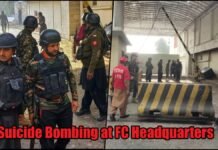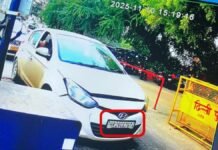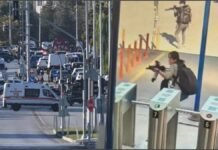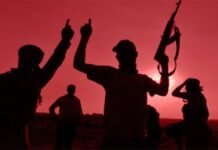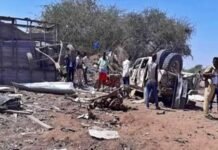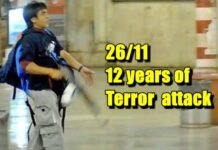
Key Points
- Suicide car bomb explosion killed at least 10 people and injured 33 near Frontier Corps headquarters in Quetta on Tuesday afternoon
- Four attackers killed in subsequent gunfight with security forces after the blast
- Emergency declared in all major hospitals across Quetta with medical teams on high alert
- CCTV footage captured the moment of explosion showing vehicle approaching FC headquarters before detonating
- No group claims responsibility yet for the attack targeting paramilitary installation
- Second major attack in Quetta this month following September 2 convoy bombing targeting former Chief Minister
Quetta: A powerful suicide car bombing struck the heart of Quetta on Tuesday afternoon, September 30, 2025, outside the regional headquarters of Pakistan’s Frontier Corps on Zarghun Road. The explosion, which occurred at approximately 3:30 PM local time, was so intense that it could be heard across Model Town and surrounding sensitive areas, shattering windows of nearby homes and buildings for miles around.
According to Balochistan Health Minister Bakht Muhammad Kakar, the attack resulted in 10 fatalities – including 8 civilians and 2 law enforcement personnel – with 33 others sustaining injuries. The injured were immediately transported to Civil Hospital Quetta, BMC Hospital, and the Trauma Center, where medical teams were placed on emergency alert.
Security Camera Captures Moment of Terror
Disturbing CCTV footage released on social media platforms shows the precise moment when an explosive-laden pickup truck approached the Frontier Corps regional headquarters before detonating in a massive fireball. The surveillance video clearly captures the vehicle making a turn from Model Town towards Hali Road when the suicide bomber triggered the explosion.
Eyewitness, who was standing outside his office near the targeted area, described the horrific scene: “I was in shock. I felt shards of glass pierce my arm and back. The blast was enormous”. Another victim, identified only as Inam, recounted from his hospital bed: “Our office is adjacent to the paramilitary facility. We were working when the explosion jolted us, and everything went dark. I heard gunfire that continued until law enforcement arrived”.
Coordinated Attack Includes Armed Assault
The suicide bombing was followed by an immediate armed assault as multiple gunmen stormed the Frontier Corps headquarters, engaging security forces in a fierce firefight. Balochistan Chief Minister Mir Sarfraz Bugti confirmed during a televised statement that four additional attackers were killed by security personnel in the subsequent gun battle.
Senior Superintendent of Police (SSP) Special Operations Quetta Muhammad Baloch reported that the coordinated attack demonstrated sophisticated planning and execution, with the suicide bomber serving as the initial assault followed by armed militants attempting to breach the security perimeter.
पाकिस्तान के क्वेटा में बम धमाका हुआ. इस दौरान हादसे में अभी तक 2 लोगों की मौत और करीब 15 लोग घायल बताए जा रहे हैं. #pakistan #quettablast pic.twitter.com/Pg1uo1E0X0
— Versha Singh (@Vershasingh26) September 30, 2025
Medical Emergency Response Mobilized
Fearing mass casualties, provincial authorities immediately declared a state of emergency across all major medical facilities in Quetta. Balochistan Health Minister Bakht Muhammad Kakar and Health Secretary Mujeeb-ur-Rehman activated emergency protocols at Civil Hospital Quetta, BMC Hospital, and the Trauma Center.
All available consultants, doctors, pharmacists, staff nurses, and paramedical teams were immediately deployed to handle the influx of casualties. Hospital sources confirmed that 26 individuals were hospitalized with varying degrees of injuries, with several listed in critical condition.
Political Condemnation and Security Response
Chief Minister Mir Sarfraz Bugti strongly condemned the terrorist attack, stating: “Such despicable attacks will not dissuade us from pursuing progress and prosperity for our citizens”. He reaffirmed the government’s commitment to making Balochistan peaceful and secure while expressing sympathy for the victims’ families.
Pakistan’s President Asif Ali Zardari issued a strong condemnation, asserting that “misguided extremists were pursuing India’s agenda,” though he provided no specific evidence for this claim. India has not responded to these allegations, and no terrorist organization has claimed responsibility for the bombing.
Escalating Violence in Resource-Rich Province
This attack marks the second major security incident in Quetta within the past month, highlighting the deteriorating security situation in Pakistan’s largest but most impoverished province. On September 2, 2025, former Chief Minister Akhtar Mengal’s convoy was targeted in a bomb blast at Shahwani Stadium parking lot, though Mengal escaped unharmed.
Balochistan, despite being rich in natural resources including natural gas, gold, and copper, remains Pakistan’s poorest province with approximately 15 million residents. The region serves as a crucial component of the $65 billion China-Pakistan Economic Corridor (CPEC), housing the strategic Gwadar Port developed by China.
Regional Security Implications
Security analyst Iftikhar Firdous noted that while the attack method wasn’t novel, “it clearly demonstrates how militants can strike at the core of a major Pakistani city”. The bombing underscores the persistent threat posed by both separatist insurgents and Islamist extremists operating in the region.
The Baloch Liberation Army and other separatist factions continue advocating for provincial independence and greater local control over natural resources, frequently targeting Chinese personnel and Pakistani security installations. The timing and coordination of this latest attack suggest continued operational capability despite ongoing security operations in the region.





































